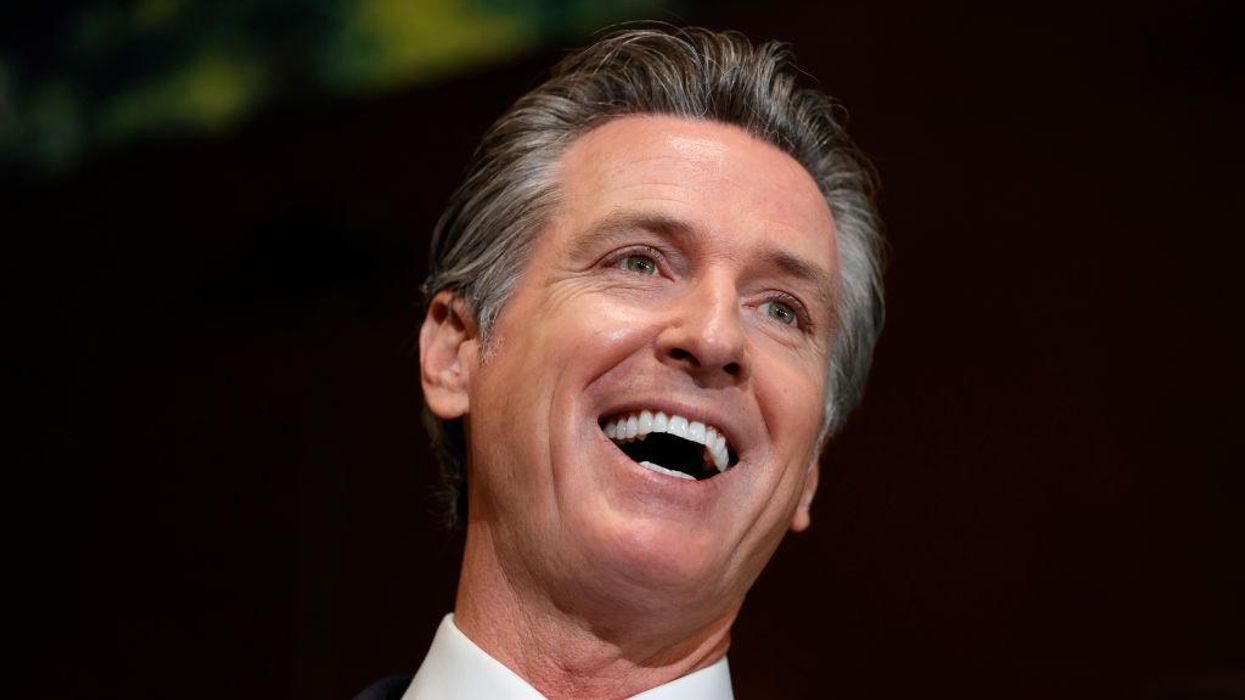
Photo by Justin Sullivan/Getty Images

Around 43,000 of California's ultra-rich won't have to pay a nominal tax hike to help facilitate the state's radical adoption of electric vehicles, thanks in large part to an energetic opposition campaign mounted by Democrat Gov. Gavin Newsom. Some critics reckon that Newsom's efforts to quash this measure reveal he is eco-friendly in rhetoric, but billionaire-friendly in action.
Proposition 30 was on the ballot this week. It called for a 1.75% tax hike on those earning over $2 million annually and was touted as a means to help subsidize the statewide adoption of so-called "zero-emission" vehicles and the development of EV charging infrastructure.
Approximately 45% of the revenue from the defeated tax would have gone toward payments to help buy new electric vehicles (e.g., cars, vans, and pickup trucks); 35% would have gone to subsidize the installation and operation of EV charging stations in both private and public locations; and 20% would have gone toward wildfire response and prevention. Priority would be given to expenditures on hiring, training, and retaining state firefighters.
According to Democratic political analyst Neel Sannappa, the tax would have "help[ed] middle-class families transition to zero-emission vehicles," as well as strengthened the electric grid, which is already under immense strain.
The California Legislative Analyst's Office claimed that the tax would raise between $3.5 billion and $5 billion annually, "growing over time."
Although an annual drop in the bucket when considering that California's transition to a 100% renewable-powered electric system may end up costing anywhere from $4.5 trillion to $5.7 trillion by 2030, the additional revenue certainly wouldn't hurt.
Ultimately, 59% of California voters rejected the proposition.
Alpine, Humbolt, Mendocino, Monterey, and San Francisco Counties voted in support, and the remainder of the state voted against the measure.
Having successfully protected nearly two points on each California multimillionaire's income, the No on 30 campaign said in a statement, "California voters decisively rejected this poorly crafted and unnecessary tax hike. ... The fact is Proposition 30 was a solution to an issue the state is already addressing."
Mary Creasman, CEO of California Environmental Voters and a supporter of the proposition, told CalMatters that Newsom, the face of the No on 30 campaign, was largely responsible for the measure's demise.
The proposition "had a record number of billionaires against it, it had complete falsehoods thrown at it, and it had the most popular Democratic leader in the state against it," said Creasman.
Matt Rodriguez, campaign manager for No on 30, said, "You can't remove the governor from it ... [Newsom is] a credible messenger on the opposition side, simply because I think of a lot of people and a lot of Democrats take their cues from him."
Newsom campaigned against the proposition, appearing in a television advertisement where he claimed it was "a Trojan horse that puts corporate welfare above the fiscal welfare of our entire state."
Newsom and other critics suggested that Lyft, which had allegedly donated over $35 million in cash and in-kind contributions to support the measure, would directly benefit from it.
Bill Magavern, one of the authors of the bill and the policy director of the Coalition for Clean Air, criticized Newsom for his characterization of the measure, suggesting that what was really at issue was "billionaires and their allies who don't want to pay their fair share of taxes."
The opposition campaign for which Newsom was the very recognizable face had some deep-pocketed backers.
Bob Emery, a wealthy San Francisco real estate investor, donated nearly $500,000 to the opposition campaign. Former Apple board member and Silicon Valley venture capitalist Arthur Rock donated $499,000. Gap Inc. director William Fisher donated $980,000 to the No on 30 campaign in September.
The attack ad wherein Newsom suggested Lyft would be the primary beneficiary was paid for in part by a California-based billionaire, Michael Moritz, a repeat Lincoln Project donor who had reportedly also spent $1 million to fight Proposition 30.
Creasman suggested that the failure of the proposition puts more pressure on the governor to find revenue streams to pay for his radical phase-out of gas-powered cars by 2035 and transition to so-called "zero-emission" programs.
"Where's the money going to come from?" asked Creasman. "If the governor has some exciting, innovative new stuff that he can pull out of his pocket and say, 'Here's how we're going to pay for it,' we are all in."
When Newsom opposed the proposition, he did so not just with billionaires averse to paying down their champion's promises, but with the state's two largest teachers' unions. Crossing the latter would have been politically inexpedient.
The California Teachers Association, which fought the Newsom recall in 2021, opposed the tax because it would have been a special fund (i.e., the "Clean Cars and Clean Air Trust Fund"). Accordingly, money might have been withheld from education coffers in a state that otherwise sees 40% of its budget siphoned into public education, per a 1998 mandate.
In October, Republican political analyst Cathy Abernathy explained why Newsom and the California Teachers Union fought against the eco-tax: it "is a special fund, permanently separate and apart from the General Fund or any other state fund or account. And in Section (c), moneys deposited into the fund and any interest earned shall not be permanently or temporarily borrowed, loaned or otherwise transferred to the General Fund or other fund in the state treasury."
Just as the teachers' unions would not have been able to get their hands on the tax revenue, neither would Newsom's administration.